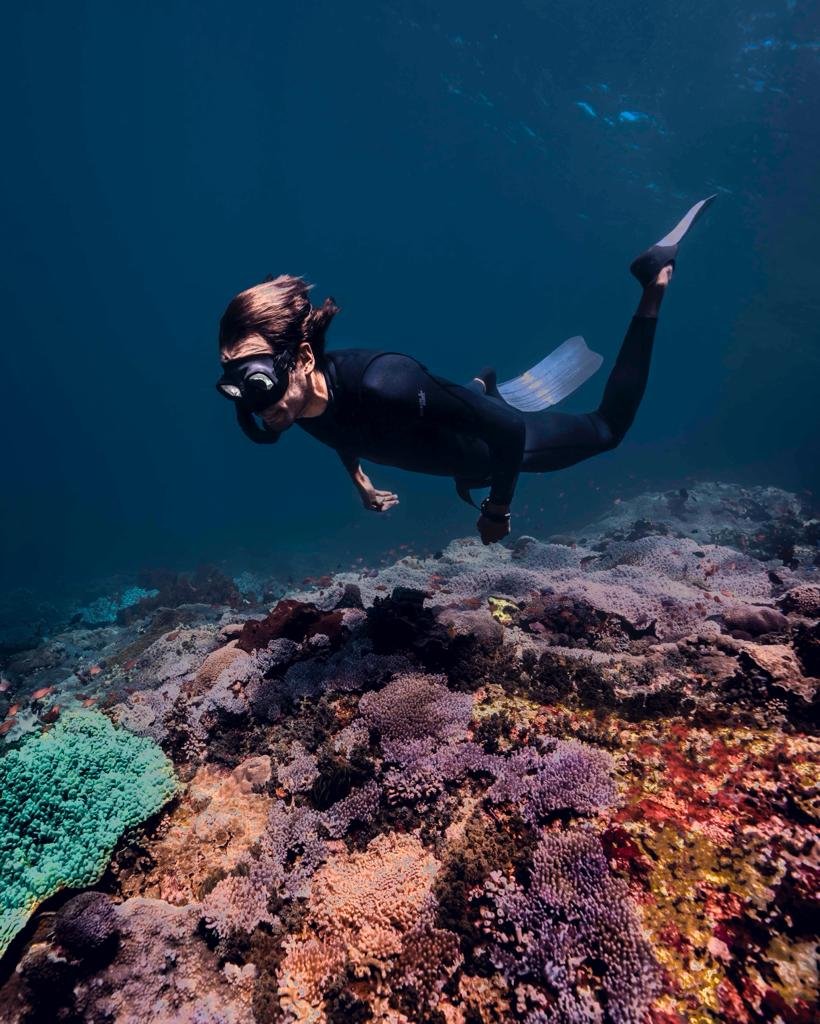Freediving, Dopamine & Ocean Therapy
What is Dopamine?
The Nervous System
Waves, Troughs & Freediving
Effects of Ocean Therapy on Dopamine
The role of dopamine has resurfaced as a trending topic, largely in part to the role of the neurotransmitter in today’s attention-driven economy. We live in ecosystems chock-full of stimulation, from relentless advertising to overwhelming comparisons, all of which can lead to intense cycles of neurological processes in our brains. As these consumptive activities become more prevalent, links are starting to be made to dopamine dysfunction, a term encompassing more than genetic predispositions and hereditary neurological disorders.
As humans scroll through their lives with such a large exposure to heightened neural activity, it is no wonder we are beginning to see the side effects play out in an ever-increasing trend of mental disorders such as anxiety, depression, and lack of focus.
In this article, we briefly discuss the role of dopamine in the body, how it helps modulate our nervous system, and how it relates (for good or for bad) to ocean therapy and sports such as Freediving.
What is Dopamine?
Dopamine is a neurotransmitter closely associated with novelty, reward, risk, and motivation. When dopamine is released, there are various physiological processes that are affected.
Pleasure and Reward
Dopamine is referred to commonly as the reward neurotransmitter as it is closely associated with pleasurable or rewarding experiences. The release of dopamine also signals the brain to seek this same experience again, and often in a higher frequency or quantity.
Emotions and Mood
Dopamine is linked to the regulation of mood and emotions and can contribute to the overall feeling of well-being. Dopamine dysfunction can likewise contribute to mood disorders such as depression.
Motivation and Movement
Dopamine not only provides a feeling of reward when an experience is over but also the anticipation of that feeling again. This can often be seen as a motivator, and dopamine reward pathways are described as a means to drive and pursuit of goals. Dopamine also helps to facilitate communication between various parts of the brain and body, facilitating motor skill function and coordination.
Risks Associated with Dopamine
As historian David Courtwright so aptly puts it in his book The Age of Addiction, much of the Western world lives in limbic capitalism, where;
“Limbic capitalism refers to a technologically advanced but socially regressive business system in which global industries, often with the help of complicit governments and criminal organizations, encourage excessive consumption and addiction.”
In other words, industries are encouraged to deal in the currency of dopamine, from cigarettes to morphine to gambling. To make matters worse, the act of consumption itself has fast become a drug. And here’s why.
All of these physiological effects carry a very real-time application that promotes the growth of neural pathways in some ways linked to survival mechanisms. The human drive for food, safety, and reproduction lies at the center of these neural pathways, and without dopamine, it could be easily hypothesized that humans would have little motivation to survive, expand, and even progress.
Yet the danger lies not in the result but more in the anticipation of it.
Remember Pavlov’s Dog that started salivating after it associated a ring of a bell with food? Our brains on dopamine illicit physical responses to stimuli throughout the day, regardless of whether the deeply imagined results will come to fruition or not.
Similar to this, modern days, reliance on various types of dopamine stimulators does more to mimic these natural biological processes rather than solve them. This can be most easily demonstrated in addictive and impulsive behaviors that can be reinforced by a dopamine-fueled positive feedback loop that results in humans getting further away from their intended biological needs.
The Nervous System
(Sympathetic vs. Parasympathetic)
Our autonomic nervous system is comprised of two balancing processes that are constantly in motion together to create neural homeostasis in the body.
Our sympathetic nervous system is responsible for our fight-or-flight response and is activated by stimuli that are perceived by the body or mind as dangerous or stress-inducing. To prepare the body for action, the sympathetic nervous system signals the heart rate to increase, allowing more blood to rush to parts of the body that may need to be used to either fight or run away. It also increased attention and focus.
The parasympathetic nervous system helps to promote rest, calmness, and relaxation, often associated with the body's recovery and digestive processes. It does so by lowering heart rate, decreasing blood flow to the extremities, focusing energy on digestion, and lowering blood pressure.
Dopamine plays a complex role in the modulation of both the sympathetic and parasympathetic nervous systems, much of which comes down to the interconnected relationship and balance of other neurotransmitters as well as conditions, receptors, and environmental stress involved. But it’s important to note that dopamine is not inherently released in response to the activation of either of these systems.
While both dopamine and the sympathetic nervous system elicit similar physiological responses (increased heart rate, increased blood pressure), research suggests that dopamine does not signal the sympathetic. Instead, the parallel sympathetic responses are mostly caused by the body's release of norepinephrine, a catecholamine similar to adrenaline.
Waves, Troughs & Freediving
Understanding how dopamine plays a crucial part in our brain chemistry comes down to a deeper understanding of how it works as a neurotransmitter. In our Fluid Focus community, we are all for water and ocean therapy, so an analogy that involves waves is perfect.
If we think of the amount of dopamine in our body at any given time as the ocean, we can refer to this as our baseline. This is the dopamine that is there but has not been bound to a receptor and, thus, is not having an effect on our neurochemistry.
As we start to have an experience, for example, we see a beautiful picture of a freediver and start to imagine what it would feel like to connect with the ocean in that way, dopamine starts to bind to receptors (D1-D5) and creates a “craving” for that experience with nothing but thought alone. Our body can actually start to react to this craving with increased blood flow, heart rate, excitement, and anticipation. This is the beginning of a wave in the ocean that is our baseline.
Very quickly after our body responds to this picture of the beautiful freediver, the higher dopamine reception (the wave) starts to drop and does so below baseline (the trough). This drop in dopamine is incredibly important, as it actually provides us the motivation to seek out that experience. It’s as if we got a taste of the experience through our thoughts, and not the drop in dopamine creates a craving that we want to fill to get back to the peak of the wave. So we impulsively sign up for a freediver course or Google “freediving Nusa Lembongan, Bali” to satiate this craving.
This is the double-edged sword of dopamine as it relates to freediving. Freediving as a sport represents a challenge; a goal-drive, adrenaline-packed idea of a sport that entices many on the journey to self-expansion and discovery. Our human curiosity to grow and progress makes freediving a perfect avenue to explore.
Yet the sport itself often provides a counterintuitive lesson to let go of intrinsic demands and instead enjoy the process rather than the result. Many freedivers would agree that, at some point, letting go of expectation is really the only way to succeed in surrendering your body and mind to the ocean in order to keep you safe.
Ocean Therapy, Freediving & Dopamine
So what do ocean therapy and freediving do to our dopamine levels?
Well, the answer is not crystal clear, as much as we would like it to be. As mentioned previously, dopamine plays a modulating role in both the sympathetic and parasympathetic nervous systems, both of which are activated simultaneously during freediving. The “goal-driven” side of freediving- i.e., reaching great depths, challenging ourselves, and achieving personal success- results in dopamine uptake and the motivation to continue deeper. Arguments can be made that without this drive, the amazing progression the sport has seen in the last 20 years would not have been possible.
Yet this drive to succeed is also one of the biggest obstacles as it relates to our personal expectations and stress levels while freediving. We become our own worst enemy.
The takeaway for us is that ocean therapy and freediving provide us an opportunity to feel into and draw awareness to our natural dopamine cycle. As is often the case with freediving, the focus given to our body and the environment allows a microscope to highlight deeper internal states of awareness. Witnessing the dopamine cycle in ourselves as we think about the dive, prepare for the dive, do the dive, and celebrate the dive is a powerful way to both understand it and learn to maintain it.
Likewise, those who may suffer from dopamine imbalances may be able to benefit from freediving and different types of ocean therapy. While some more polarized dopamine imbalances are often tied to genetic predispositions, others can be related to exposure and moderate addiction to various forms of high-intensity dopamine uptake. With our constant exposure to social media, internet consumption, and other attention-driven mediums, it is not uncommon to feel the effect of a dopamine imbalance, even at moderate levels.
Freediving provides a powerful opportunity to check out so we can check in, allowing the ocean to autonomically influence our bodies and calm our minds.
Fluid Focus is a community of water explorers who use the ocean as a means of connecting back with themselves. Whether you are a freediver, surfer, or part-time ocean lover, we share a passion for the ocean. Fluid Focus Retreats are all immersive ocean therapy retreats that incorporate freediving, yoga, meditation, and mindset practices to help people connect with the ocean, connect with themselves, and connect with others.
References
Books:
1. Lembke, Anna. Dopamine Nation: Finding Balance in the Age of Indulgence. New York, New York: Dutton, an imprint of Penguin Random House LLC, 2021.
2. Nichols, Wallace J. Blue Mind : the Surprising Science That Shows How Being near, in, on, or under Water Can Make You Happier, Healthier, More Connected and Better at What You Do. New York :Little, Brown and Company, 2014.
Web Articles:
https://hubermanlab.com/the-science-and-use-of-cold-exposure-for-health-and-performance/
https://www.freedivewire.com/neuroscience-of-dopamine-and-freediving/





